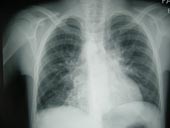Peer Reviewed
Feature Article Paediatrics
Investigation of the child with recurrent pneumonia
Abstract
An underlying cause is found in most children with recurrent pneumonia. Children with focal pneumonia, failure to thrive, comorbidities or chronic suppurative symptoms are most likely to have a significant predisposing condition and require specialist assessment.
Key Points
- Recurrent pneumonia is defined as two or more episodes in a year or three or more episodes ever, with radiographic clearing between episodes.
- A systematic approach to recurrent pneumonia will identify those children with potentially more serious conditions while not over-investigating those with recurrent viral illnesses or unrecognised asthma.
- A persistent wet cough is abnormal in childhood (a recurrent wet cough is, however, common in children under the age of about 5 years, who have frequent viral lower respiratory tract infections and/or asthma).
- An estimated 6 to 9% of children hospitalised with pneumonia have had a previous episode: most of these children have an identifiable predisposing condition.
- A delay in diagnosis of the underlying cause of recurrent pneumonia may be associated with a significant decline in lung function and bronchiectasis.
- Children with focal disease, failure to thrive, comorbidities or chronic suppurative symptoms require specialist assessment.
Purchase the PDF version of this article
Already a subscriber? Login here.

